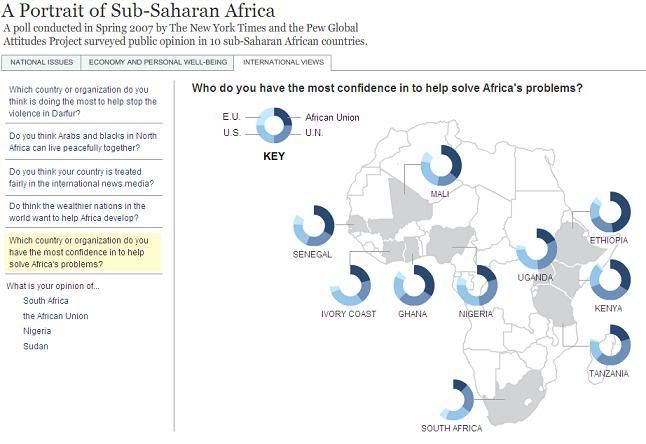The Times has an interesting and interactive map (I'm a sucker for these) showing the results of a poll taken on attitudes in several sub-Saharan countries: Senegal, Mali, Uganda, Ivory Coast, Ghana, Nigeria, Ethiopia, Kenya, Tanzania and South Africa.
Some of the results are obvious, and others are not. The poll covers national issues, the economy and personal well-being, as well as international views. The most pressing national concerns seem to be "HIV/AIDS and other diseases," "corrupt political leaders," "crime" and "illegal drugs." Ethnic/religious conflict was seen as a problem by more than half of those polled in Kenya, Ivory Coast and Nigeria, with the latter polling particularly high.
Despite this, those polled seemed fairly optimistic, and those polled in every country overwhelmingly thought things would be better for their children than they have been for them.
Opinions vary pretty widely on the UN, US and AU, depending on the country, with Ethiopia unsurprisingly showing the most support for the AU, which is headquartered in Addis Ababa and the EU scoring particularly low overall for Africans' confidence that it can "help solve Africa's problems."
In would have been interesting to have added more countries with one foot in "Arab Africa" and the other foot in "black Africa," particularly Sudan, Chad and Mauritania. Out of all the countries polled, the only two where the majority don't think that "Arabs and blacks in North Africa can live peacefully together" were Uganda and Tanzania.

1 comment:
Sean,
I wish I knew more about these Ivory coast countries. I have a Senegalese friend (whose name I will not mention here) who has been researching the stunning question of why the Senegalese have continuously elected a Christian president in a country that is more than 90% Muslim. I think you are right to perhaps imply that many of these countries are necessary to look at for anyone who cares about working examples of tolerance and co-existence.
I'll mention this poll to him and ask what he thinks.
I'll send you a longitudinal ethnographic study about Nigerian identity (pre-colonial to post-colonial) by David Laitin. I also recommend "Some Trouble with Cows" by Beth Roy; she investigates how local conflicts escalate into ethno-religious ones, at least in India and Pakistan. Both are terrific studies in group identity formation
Cheers,
KM
Post a Comment